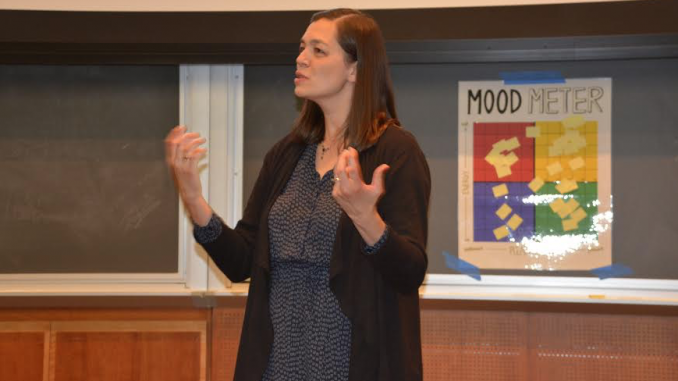
A workshop event hosted by the Maya Gold Foundation encouraged parents, teenagers and a handful of SUNY students to speak out on a topic that is often glossed over in today’s society: emotions.
Representatives from the Yale Center for Emotional Intelligence presented “Emotions Matter” on Thursday, Oct. 27 in the Coykendall Science Building Auditorium. The presentation was part of the Maya Gold Foundation’s three-part Fall Community Series to raise awareness and initiate conversations about issues facing youth. After 15-year-old Maya Gold took her own life last October, her family started the foundation with the mission to “empower youth to access their inner wisdom and realize their dreams.”
Mathew Swerdloff, Maya’s father and president of the foundation, participated in a conference at the Yale Center of Emotional Intelligence, became familiar with their “RULER” model for dealing with emotions, and decided to invite them as part of the foundation’s fall series.
According to the Yale program’s representatives, Kathryn Lee and Shauna Tominey, RULER began as a research project 25 years ago and stands for “recognizing, understanding, labeling, expressing and regulating” emotions. The RULER website states that it is “an evidence-based approach for integrating social and emotional learning into schools.”
“Many teens are not taught to identify their own emotions and the emotions of others and that can be a handicap in the world,” Swerdloff said.
Elise Gold, Maya’s mother and foundation treasurer, agreed that emotional intelligence is key for youth to reach their goals. The “Emotions Matter” program spoke to what she learned upon reading her daughter Maya’s texts after her death. Gold said that the program is about giving parents and their children the tools to negotiate their emotions.
“It’s something that’s missing in this culture because of social media,” she said. “It’s funny that it’s called ‘social.’ There’s no face-to-face interaction, so it’s hard to gauge where people are coming from.”
Lee and Tominey sought to bridge this gap between inner emotions and conversation, leading the evening’s discussion on emotional intelligence which they defined as “an intentional response to emotions that helps understanding of yourself and others.” Participants were encouraged to call out and engage with the presentation, at some points breaking out into groups to address their feelings on a topic.
Tominey presented the “Mood Meter” chart and participants conversed about where they wanted to be versus where they are when they wake up in the morning. This began a healthy conversation about how different emotions are expressed in different ways.
“We all have a wide range of emotions,” Tominey said. “How do emotions help or derail us?”
She went on to reference “Inside Out,” the 2015 Pixar movie that personified the main character’s conflicting emotions about moving to a new town, and ultimately concluded that she needed “Sadness” to get her through the rough time.
Tominey also emphasized that this type of emotional education is vital for teenage students, citing a Yale Center for Emotional Intelligence survey of 22,000 teens across the country which revealed that stress, tiredness and boredom were the most felt by high school students. She said that after some of her talks, teenagers approach her and say they don’t know how to begin conversations about the stresses of high school and home life.
“They wanted a voice,” she said. “We all want a voice.”
The Maya Gold Foundation is hosting the last event of the Fall Series, a one-man performance by Mykee Fowlin, “You Don’t Know Me Until You Know Me,” at the Rosendale Theater on Thursday, Nov. 17 at 7 p.m. The foundation encourages SUNY students who identify with their mission to take advantage of their volunteer opportunities.
